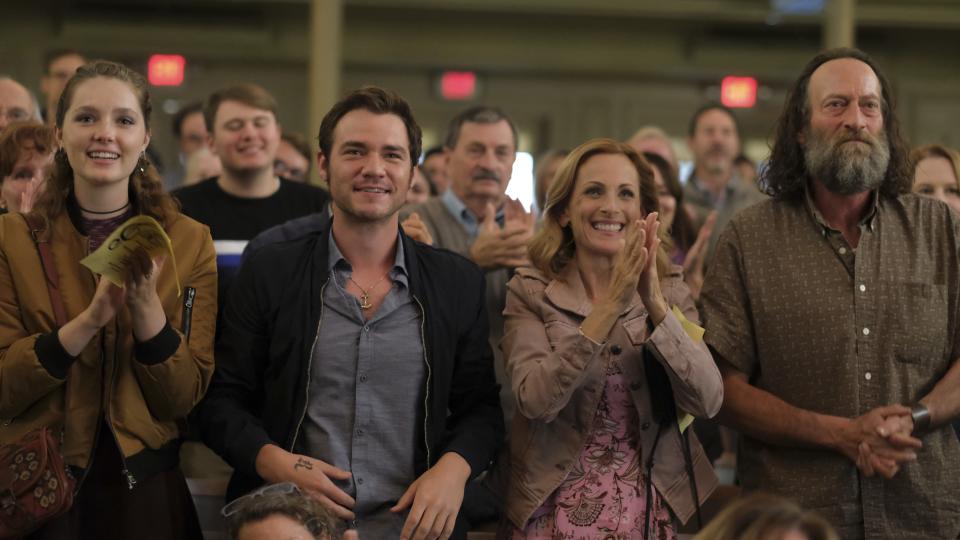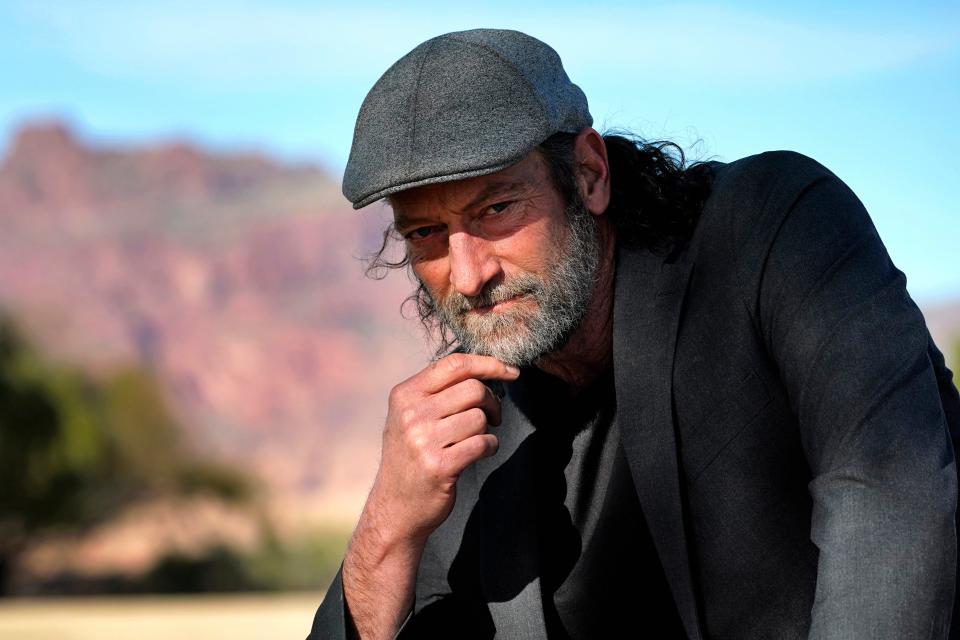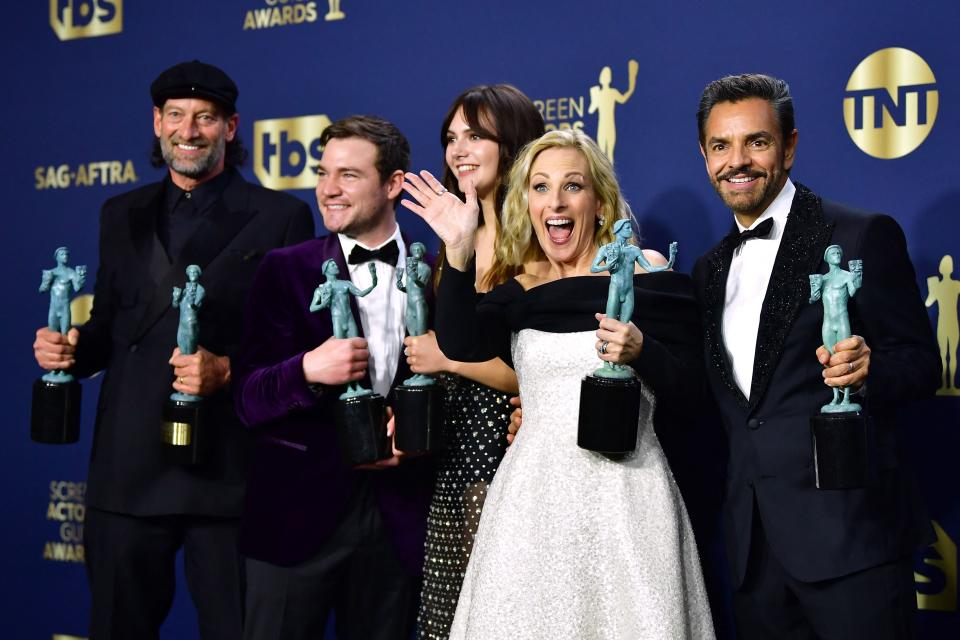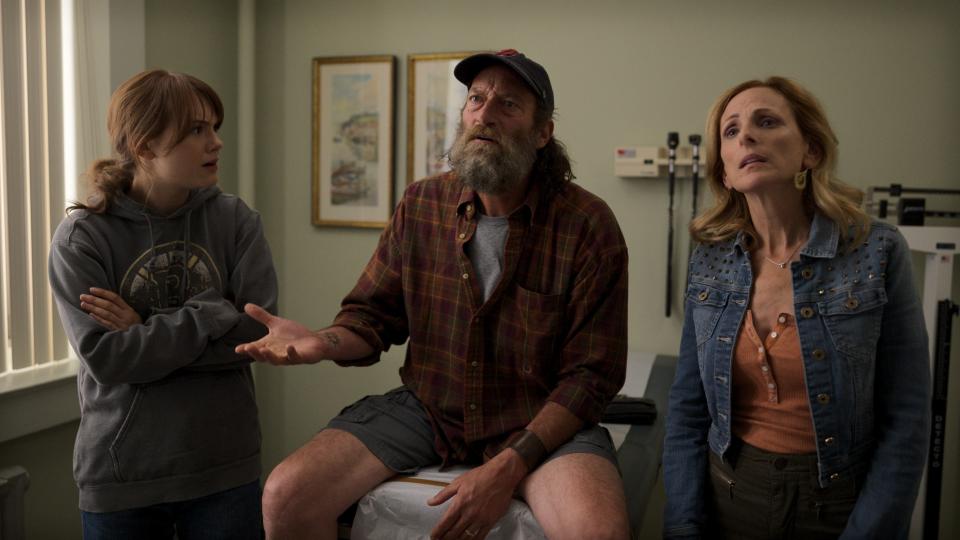'CODA' star Troy Kotsur talks best picture Oscar chances: 'It would be a historic moment'
- Oops!Something went wrong.Please try again later.
- Oops!Something went wrong.Please try again later.
- Oops!Something went wrong.Please try again later.
Troy Kotsur is the breakout star of awards season.
After three decades working in theater, along with guest spots on TV series such as "Scrubs" and "The Mandalorian," the charismatic deaf actor is finally getting his Hollywood moment in Apple TV+ dramedy "CODA" (now streaming). The feel-good film is nominated for three Oscars including best picture, best adapted screenplay and best supporting actor for Kotsur, who has dominated the category at other shows this year including the Critics Choice, Screen Actors Guild and British Film Academy awards.
He is now the front-runner to take the Oscar come March 27. If he wins, he'll become only the second deaf performer to do so, after his "CODA" co-star Marlee Matlin's historic 1987 best actress victory for "Children of a Lesser God."
Kotsur, 53, has embraced the spotlight with ease: lighting up red carpets with his bold suits and genial smile and delivering hilarious, heartfelt acceptance speeches in American Sign Language.
'We are not costumes': Why Marlee Matlin put her foot down, insisting 'CODA' cast deaf actors
"To be honest, it's not what I expected," Kotsur says of his newfound celebrity via ASL translator during a recent video call. "I'm starting to understand what so many actors have to go through: a lot of interviews, a lot of wardrobe changes. I'm used to just going to Ross and now I have all these brands bringing me racks of clothing to try on, like Dior Men, Brooks Brothers, Hugo Boss. But it's been really fun to dress up – it makes me feel like a new man."

In "CODA," which stands for "child of deaf adults," Kotsur plays a working-class fisherman named Frank Rossi, whose hearing teenage daughter, Ruby (Emilia Jones), wants to pursue her singing dreams at Boston's Berklee College of Music. Frank, his wife Jackie (Matlin) and son Leo (Daniel Durant, who is also deaf) struggle to understand Ruby's musical passion, and she wrestles with staying home to help run the family business.
Although the film's producers at one point considered casting an A-list hearing actor to play Frank, that quickly dissipated as soon as writer/director Sian Heder showed them Kotsur's audition.
"It was so undeniable. It was very clear that no one was ever going to be better for the part than he was," Heder says. Now, "to see him getting the kind of recognition that he's getting, it's incredible. It's the best feeling in the world. If what comes out of this movie is that I made Troy Kotsur a movie star, I can die happy."
Kotsur talks more with USA TODAY about the Oscars, deaf representation in Hollywood and his emotional "CODA" connection:
'An amazing ride': 'CODA' earns top prize at PGA Awards. Is Oscar best picture next?

Question: You've been everywhere these last few weeks between awards shows and events. Who have you been most excited to meet?
Troy Kotsur: The other day, I met Steven Spielberg at the Oscar luncheon. I've been a big fan of his work since I was a kid and I told him, "Thank you for your amazing storytelling. You inspired me." That's one of the reasons I became an actor – he was so talented at portraying a visual language even without dialogue.
Q: You wanted to be a director before you became an actor, correct?
Kotsur: That is right – I was inspired by Steven Spielberg. But I realized Hollywood would not be ready for a deaf director and I saw all these barriers out there. So it was a great excuse for me to become an actor because then I could work with so many directors and witness how their process worked. And I found I really enjoyed acting. I'm going to go back to directing at some point, but it's important to find the right script. I would like to do something similar to Steven Spielberg's style, especially with sign language.

Q: Coming up as an actor, you've said you would sometimes send out 1,000 headshots and maybe only land one audition. What motivated you to keep going?
Kotsur: If I wasn't acting for a year, I wasn't myself: I was moody, I was angry, I was frustrated. I knew something was missing. And when I went back to acting, I felt so much better. It was like my medicine. I didn't understand why, but I just needed to follow my gut and continue acting and see what it led to. Now with these nominations, I feel like, "Whew! Thank you, gut. I love you."
Q: Many people are predicting "CODA" could win the best picture Oscar after you and your co-stars won best ensemble at the Screen Actors Guild Awards. How does it feel to be in that conversation?
Kotsur: (Laughs.) I just knocked on wood. But if that does happen, of course, it would be amazing. It would be a historic moment and I feel like we would have reached the next level for Hollywood and deaf actors, to really give more room for diverse storytelling and begin to think outside of their box. Everyone has a story to tell.

Q: This past year and a half, there have been deaf and CODA actors in other movies such as "Sound of Metal," "Eternals" and "A Quiet Place Part II." Are you encouraged by the representation we're seeing?
Kotsur: I do see Hollywood beginning to improve. "Sound of Metal" is a great introduction for hearing people because it's about a hearing person losing their hearing, so this (character) needs to begin to make that transition into deaf culture. "Eternals" having a deaf superhero (is like), "Oh, wow, that's cool!" And the young deaf actress (Millicent Simmonds) in "A Quiet Place" is so talented. So I see these deaf folks popping up and it really shows that Hollywood is beginning to give more room to (deaf) creatives, rather than just pitying deaf people as the victim.
The deaf community, we have heroes. That's why I love Frank Rossi in "CODA," because he's a hardworking man who cherishes his family. He has frustrations being in the hearing world, but he also has a dirty sense of humor and loves dropping F-bombs.
More: How Riz Ahmed worked to honor deaf culture in 'Sound of Metal'

Q: Did you get to teach anyone the signs for your favorite swears?
Kotsur: Oh, absolutely. When we were on set, our whole crew was asking me, "Hey Troy, how do you sign this?" Because they'd get frustrated with someone and want to call them out. But instead of yelling, they wanted to sign to insult each other, which was really cool. One of my favorites is "screw you." (Sticks left middle finger into clenched right fist.) It's like you're a screwdriver screwing a screw into the wall.
Q: There's a beautiful scene in "CODA" where Frank touches Ruby's neck while she's singing to feel the vibration of her music. As the father of a 16-year-old hearing daughter, how did that resonate with you?
Kotsur: (One) morning, my dog was staring at my daughter as she was playing the piano. I said to myself, "There's something I may be missing." I can't hear since birth, but I'm so grateful because I can always sleep well at night. But I decided to walk up to the piano and just put my hands there. I could feel the vibration, the intonation, and the rhythm of the music, and I'd see how her hand movement and the intensity she was playing at would make it a bit louder.
She was following the sheet music and learning a few songs. I asked my daughter, "What's your favorite song?" So she taught me several songs and explained why she liked them. Sometimes there's swearing and I say, "Hey, you're too young! Watch that language with those songs!" I have to look at the (sheet music) and say, "OK, I'll accept that." But I went through that type of thing, just learning a lot about music through my CODA daughter.
This article originally appeared on USA TODAY: Oscars 2022: Troy Kotsur taught 'CODA' crew to swear in sign language

